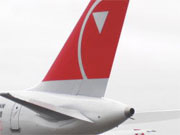Moorhead, Minn. — If you're going to fly out of Duluth your choices are limited. You can fly Northwest Airlines, one of it's regional partners or you can charter a plane. Many Minnesota communities are in a similar situation. Since the airline filed for Chapter 11 bankruptcy protection industry analysts have speculated the carrier may drop service to some towns.
Brian Ryks is the executive director of the Duluth Airport Authority. He says he's not worried.
"We've had discussions with Northwest and the information we've received from them is that from a passenger standpoint or an airport standpoint we should not notice any changes," says Ryks. "They've indicated they don't expect anything different from what's scheduled in Duluth."
For towns like Thief River Falls in northwest Minnesota, air service is a critical part of staying competitive economically.
Ron Lindberg is the public works director in Thief River Falls. The town is served by Mesaba Airlines, a Northwest regional partner. Lindberg says Thief River Falls was recently designated an essential air service community.
That means for the next two years the government will pay part of Mesaba's operating costs. Lindberg says air service is important, not only for Thief River Falls, but the entire region.
"We service not only the citizens of northwest Minnesota but also major businesses," says Lindberg. "We have Arctic Cat, Marvins and Polaris industries and a number of other communities that are all within 40 miles of Thief River."
Lindberg says because of the essential air service designation, it's unlikely the region will lose air service.
Other communities say chances of losing air service are slim. Officials in Sioux Falls, South Dakota say Northwest offers nine flights a day, that generate up to $24-million in revenue for the company. It's unlikely the airline will drop those flights.
Some smaller cities had worries before Northwest filed for bankruptcy. Steve Johnson is head of the Grand Forks Regional Airport Authority.
Johnson says Northwest was changing the rotation of its planes into Grand Forks; more smaller planes were scheduled for the city, meaning fewer seats were available.
The airport had another problem. More passengers were driving to Fargo or the Twin Cities to board planes, Johnson says that's reason for concern.
"It's hard to build air service for a community if it's not maximizing the advantage of having existing service," says Johnson. "You know, some of that may play into Northwest's decisions, in other words they look and see that our passengers are choosing to fly else where."
Johnson says people are willing to drive to Fargo or the Twin Cities to get a better schedule or a cheaper flight. Johnson says there are no indications from Northwest they'll drop Grand Forks from their schedule. He says for now, there are no plans to recruit another carrier to the city.
"Attracting another airline when your existing boardings are kind of neutral over the last several years is, I won't say is an impossible task, but it is a very difficult task," says Johnson. "Unless you just throw money at them and bribe them to come into your market and that's no long term solution, that will only work as long as the money lasts."
Johnson says at this point there is no reason to panic about losing air service. He says there is little communities can do until the airline reveals its plans for emerging from bankruptcy.




